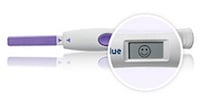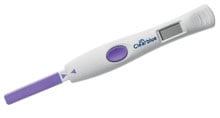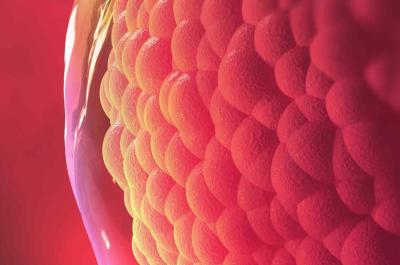
Ovulation is the name of the process that happens usually once in every menstrual cycle, when hormone changes trigger an ovary to release an egg. In this article, we look more closely at this process and explain how you use this knowledge to help you to become pregnant.
- Ovulation is the process when hormone changes trigger an ovary to release an egg.
- You can only become pregnant if a sperm meets with and fertilises an egg.
- Ovulation normally occurs 24 to 36 hours after the luteinizing hormone (LH) surge, so identifying this LH surge helps you to determine when you are about to ovulate.
- Sperm can remain active for up to five days, so couples can conceive by having intercourse prior to the egg being released.
- Clearblue Ovulation Tests are at least 99% accurate at detecting the LH surge.
Ovulation
Ovulation is the name of the process that happens usually once in every menstrual cycle when hormone changes trigger an ovary to release an egg. You can only become pregnant if a sperm fertilises an egg. Ovulation usually happens 12 to 16 days before your next period starts.
The eggs are contained in your ovaries. During the first part of each menstrual cycle, one of the eggs is being grown and matured.
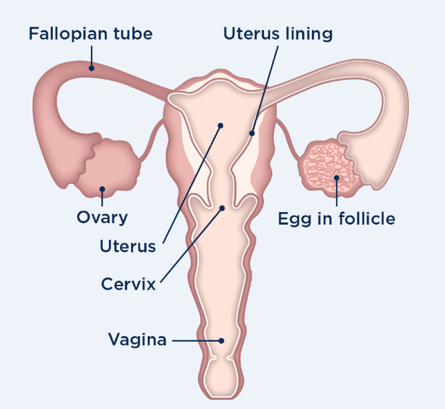
- As you approach ovulation, your body produces increasing amounts of a hormone called estrogen, which causes the lining of your uterus to thicken and helps create a sperm friendly environment.
- These high estrogen levels trigger a sudden increase in another hormone called luteinising hormone (LH). The ‘LH’ surge causes the release of the mature egg from the ovary - this is ovulation.
- Ovulation normally occurs 24 to 36 hours after the LH surge, which is why the LH surge is a good predictor of peak fertility.
- The egg can only be fertilised for up to 24 hours after ovulation. If it isn’t fertilised the lining of the womb is shed (the egg is lost with it) and your period begins. This marks the start of the next menstrual cycle.
Can I ovulate more than once during my cycle?
Professor Bill Ledger, Fertility Specialist
Yes, it's possible to ovulate twice but this usually happens at about the same time of the cycle. This is how non-identical twins occur, from ovulation of two separate eggs. It happens more often in women over 35 which is one reason why the older group have more twins (the other is that many IVF clinics will replace two embryos for older patients whereas those under 40 generally have one embryo replaced)
What is the difference between ovulation and fertile days?
While an egg only survives for up to 24 hours, sperm can remain active for up to five days. It may therefore be surprising to learn that a couple can conceive through sexual intercourse four to five days before the egg is released.
The total ‘fertility window’, taking into account the lifetime of both the sperm and the egg, is about six days. The 'fertile days' are all the days during your menstrual cycle when you have the ability to become pregnant if you have unprotected sex.
Identification of additional fertile days provides couples with more flexibility to plan intercourse around their lifestyle and also more opportunities to conceive, which may reduce the pressure that couples can experience when trying to get pregnant.
When is a woman most fertile?
The days during each cycle when you are most fertile, and therefore most likely to get pregnant from unprotected sex, are the day of ovulation and the day before – these are the two days of peak fertility. There are also a few days before this when you experience high fertility and also have an opportunity to get pregnant. Outside this ‘fertility window’ of about six days, the chances of getting pregnant are low.
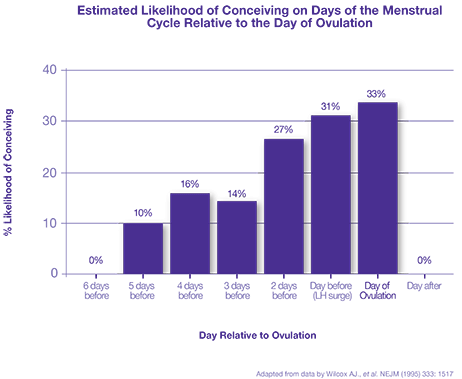
The graph above illustrates there is still a chance to conceive in the days prior to ovulation.
When is ovulation?
Menstrual cycle length varies from woman to woman and from cycle to cycle but is typically between 23 and 35 days. Ovulation usually happens 12-16 days before the next period. Many women think that they ovulate on day 14 but this is just an average. Most women will actually ovulate on a different day of the menstrual cycle, and this will also vary from cycle to cycle. In fact, 46% of menstrual cycles vary by seven or more days1.
Some women claim to feel a twinge of pain when they ovulate, but many feel no sensation at all and there are no other physical signs of ovulation. To get pregnant, it’s important to have intercourse on your fertile days; if you want to find out when are your most fertile days, it’s important to get to know your own body and your own personal menstrual cycle.
Professor Bill Ledger, Fertility Specialist
“Everyone is different and women cannot rely on population averages to understand their own fertility. Understanding when they ovulate is one of the easiest steps that women can take to understanding their fertility, and ovulation tests are the easiest way for women to accurately predict when they will ovulate. Conventional LH tests give couples one to two days advanced warning of ovulation. Clearblue have also developed more advanced products that give women even more information.”
I'm not sure I ovulate every month, what might cause this?
Professor Michael Thomas
Women sometimes don't ovulate every month for a number of reasons. If your cycles are usually over 35 days, you may not be ovulating consistently or not at all. The majority of women who do not ovulate and are not pregnant, may have Polycystic Ovary Syndrome (PCOS). PCOS is a condition that you are born with and can cause a woman not to ovulate (release an egg) on a regular and consistent basis. These women may also have adult acne or an increase in hair growth above the lip or below the chin. On ultrasound, the ovaries may be seen to have many small cysts inside them that remain at a small size. Other conditions that can cause you not to ovulate include low thyroid function (hypothyroidism), high prolactin production (hyperprolactinemia), and during the time prior to the menopause (perimenopause). If you feel that you are not ovulating consistently, you should see your health care provider.
Read more about Anovulation.
How long does ovulation last?
As ovulation is the release of an egg from an ovary it’s almost instantaneous – the follicle bursts and the egg is propelled very quickly into the Fallopian tube.
- 1. Creinin, MD., et al. Contraception (2004) 70: 289-92
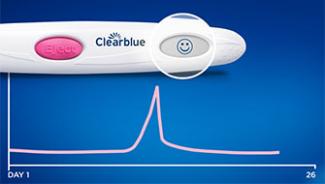
Digital Ovulation Test: pinpoints your 2 most fertile days
In every cycle there are only a few days when a woman can conceive, so having sex on these days is very important if you are trying to get pregnant.

